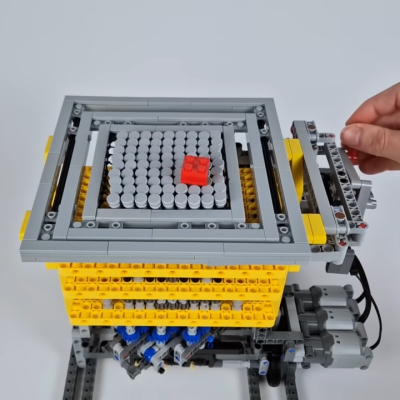Gaze Upon This Omni-directional Treadmill’s Clever LEGO Construction

Want to see some wildly skillful LEGO construction? Check out [Banana Gear Studios]’ omni-directional treadmill which showcases not only how such a thing works, but demonstrates some pretty impressive problem solving in the process. Construction was far from straightforward!

In principle the treadmill works by placing an object on a bed of identical, rotating discs. By tilting the discs, one controls which edge is in contact with the object, which in turn controls the direction the object moves. While the concept is straightforward, the implementation is a wee bit more complex. LEGO pieces offer a rich variety of mechanical functions, but even so, making a 9×9 array of discs all rotate in unison turns out to be a nontrivial problem to solve. Gears alone are not the answer, because the shafts in such a dense array are a bit too close for LEGO gears to play nicely.
The solution? Break it down into 3×3 self-contained chunks, and build out vertically with gimbals to take up the slack for gearing. Use small elastic bands to transfer power between neighbors, then copy and paste the modular 3×3 design a few times to create the full 9×9 grid. After that it’s just a matter of providing a means of tilting the discs — which has its own challenges — and the build is complete.
Check out the video below to see the whole process, which is very nicely narrated and illustrates the design challenges beautifully. You may see some similarities to Disney’s own 360° treadmill, but as [Banana Gear Studios] points out, it is a technically different implementation and therefore not covered by Disney’s patent. In an ideal world no one would worry about getting sued by Disney over an educational LEGO project posted on YouTube, but perhaps one can’t be too careful.
from Blog – Hackaday https://ift.tt/YCuB7s2
Comments
Post a Comment